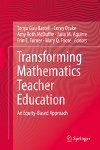- About MAA
- Membership
- MAA Publications
- Periodicals
- Blogs
- MAA Book Series
- MAA Press (an imprint of the AMS)
- MAA Notes
- MAA Reviews
- Mathematical Communication
- Information for Libraries
- Author Resources
- Advertise with MAA
- Meetings
- Competitions
- Programs
- Communities
- MAA Sections
- SIGMAA
- MAA Connect
- Students
- MAA Awards
- Awards Booklets
- Writing Awards
- Teaching Awards
- Service Awards
- Research Awards
- Lecture Awards
- Putnam Competition Individual and Team Winners
- D. E. Shaw Group AMC 8 Awards & Certificates
- Maryam Mirzakhani AMC 10 A Awards & Certificates
- Two Sigma AMC 10 B Awards & Certificates
- Jane Street AMC 12 A Awards & Certificates
- Akamai AMC 12 B Awards & Certificates
- High School Teachers
- News
You are here
Transforming Mathematics Teacher Education

Publisher:
Springer
Publication Date:
2019
Number of Pages:
181
Format:
Hardcover
Price:
139.99
ISBN:
978-3-030-21016-8
Category:
Collection
[Reviewed by , on ]
Cristina Runnalls
11/9/2019
Transforming Mathematics Teacher Education: An Equity-Based Approach is a volume of interconnected papers that expand upon the Teachers Empowered to Advance Change in Mathematics (TEACH Math) Project. Papers discuss both the background and potential implementation of the TEACH Math project, as well as accounts of the modules in action in a variety of different contexts.
The book is arranged in four parts. The first part provides background information about the TEACH Math project, including in-depth descriptions of the three modules and tips for implementation. The latter three parts explore the modules in greater depth, including stories of implementation in different contexts, successes found, and lessons learned.
Part I provides much of the background for the TEACH Math project. Chapter 1 develops the theoretical foundations of the project, including positioning teacher learning as a socio-cultural activity, addressing the need for teachers to meaningfully connect to children’s home- and community-based funds of knowledge, and recognizing and coming to appreciate children’s multiple mathematical knowledge bases (MMKB). This framing is expanded upon in Chapter 2, which discusses the three modules of the TEACH Math project: (1) Mathematics Learning Case Study Module; (2) Community Mathematics Exploration Module; and (3) Classroom Practices Module. Chapter 3 concludes with detailed potential timelines, options for adaptation, and tensions to expect from the use of the modules, all intended to help support mathematics teacher educators (MTEs) in the implementation of the project.
Parts II and III delve further into two modules of the TEACH Math Project. Part II offers several stories, reflections, and studies surrounding implementations of the Community Mathematics Exploration Module. Papers cover topics such as helpful scaffolding for preservice teachers [PSTs] (Chapter 4), analyses of PSTs’ reflections and learning following community exploration (Chapters 5 and 6), and use of the module to branch into teaching for social justice (Chapter 7). Part III offers a similar examination for the Classroom Practices module. Papers cover topics such as classroom video analyses as a way to deeply explore number learning in early childhood contexts (Chapter 8), as well as the use of the module to connect curriculum and community spaces (Chapter 9).
Part IV takes a step away from exploration into specific modules and speaks more broadly to ideas of identity, positionality, and praxis across the TEACH Math project. Papers focus specifically on the potential of mathematics autobiographies to open humanizing learning spaces in classrooms (Chapter 10), activities (including autobiographies) that serve to support PSTs’ learning, openness, and critical reflection (Chapter 11), and the experiences, resources, and stories of bilingual PSTs as told through their autobiographies (Chapter 12).
There were several interesting notes observed across the variety of papers and articles. The first was the openness of many of the authors when discussing their and their students’ own identities, concerns, roadblocks, successes, and much more. Given the theoretical focus on teacher learning as a sociocultural endeavor, the authors and editors certainly embraced this viewpoint in the text, and there is a strong feeling of sharing and learning together. Moreover, the text was rich with tips, suggestions, and scaffolds for MTEs hoping to implement these modules. On the other hand, there was some disconnect in the structure of the opening section and the subsequent four parts. Though all three modules are discussed at various points in the text, two received dedicated sections, while the third was interspersed throughout; the last section of the text addressed a broader view of identity and positionality. That is, the organization was at times inconsistent.
This book may be recommended for mathematics teacher educators interested in including a more equity-focused lens into their teacher education programs, particularly those who may not have experience in this arena. The TEACH Math project offers several entry points for beginners and intermediates alike, and the papers included in this text offer numerous thoughtful tips and reflections on implementation. This makes the text particularly useful as a personal reference guide, especially when implementing specific ideas, modules, or the entirety of the TEACH Math project.
Dr. Cristina Runnalls is an Assistant Professor of Mathematics & Statistics at Cal Poly Pomona, with a focus on Mathematics Education. Her research focuses primarily on the mathematics education of emergent bilingual students, with additional work in both pre-service and in-service teacher education.
See the publisher's web page.
- Log in to post comments




